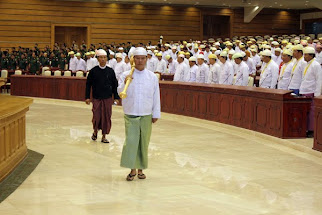Myanmar’s government began releasing hundreds of political prisoners after signing a cease-fire with the country’s largest armed rebel group, two conditions set by Western nations for lifting sanctions.
Prisoners including pro-democracy activists, ethnic minority leaders and an ex-prime minister who fell out of favor with the former ruling junta were set free today, according to the Democratic Voice of Burma, an Internet news service run by exiles. They are among 651 prisoners included in a presidential pardon, the Associated Press reported.
“This could be the big prisoner release that everyone has been waiting for,” Thant Myint-U, a former United Nations official who has written two books on Myanmar, said in a telephone interview. “It’s a number greater than the National League for Democracy’s number of prisoners of conscience,” he said, referring to top dissident Aung San Suu Kyi’s party.
Freeing political prisoners has been a primary demand of U.S. and European policy makers who impose sanctions on Myanmar, one of Asia’s poorest countries whose 62 million citizens earn an average of $2.20 per day. U.S. Secretary of State Hillary Clinton urged Myanmar President Thein Sein during a visit in December to free prisoners and improve ties with ethnic groups as a condition for easing restrictions.
The prisoners released today included Min Ko Naing, a student leader from a 1988 uprising, and Khun Tun Oo, a Shan ethnic leader, the AP reported. Former Prime Minister Khin Nyunt was also freed after more than seven years under house arrest, the Democratic Voice of Burma reported.
Independent Monitors
“Years of international calls to release long-detained political prisoners seem to have pushed the government to finally do the right thing,” Elaine Pearson, deputy Asia director for New York-based Human Rights Watch, said in a statement. “The next step for Burma’s government is to allow international monitors to verify the whereabouts and conditions of remaining political prisoners.”The number of jailed dissidents in Myanmar is disputed. Suu Kyi, who spent 15 years in confinement before her release in 2010, called for the government to free 525 political prisoners on Nov. 16. The Thailand-based Assistance Association for Political Prisoners (Burma) said Dec. 23 that more than 1,500 dissidents remained locked up.
‘Good News’
The prisoner release follows an agreement signed yesterday with the Karen National Union in a bid to end more than 60 years of fighting in one of the world’s oldest conflicts.“This is good news for the people of Burma,” U.K. Foreign Secretary William Hague, who traveled to Myanmar for talks last week, said in an e-mailed statement, referring to the country by its former name. State Department spokeswoman Victoria Nuland yesterday called the cease-fire “a good step.”
“This is an incredibly significant moment,” Jim Della- Giacoma, Southeast Asia project director for the International Crisis Group, said by telephone from Jakarta. “It could be a tipping point and lead other major armed groups that have not yet signed cease-fires with the government to do so.”
Hague offered last week to lift sanctions on Myanmar in return for “bold steps” toward increased freedom and democracy, echoing Clinton’s statement from last month.
European Union sanctions on Myanmar include asset freezes on state-owned companies as well as travel restrictions on officials. U.S. measures ban imports, restrict money transfers, curb aid funding and target jewelry with gemstones originating in Myanmar.
Return to Myanmar
Chevron Corp. (CVX), based in San Ramon, California, is one of the few U.S. companies operating in Myanmar through its 2005 purchase of Unocal Corp., which invested in a gas field and pipeline prior to a 1997 ban on new investment. Standard Chartered Plc (STAN), the U.K. bank that earns more than two-thirds of its profit in Asia, said this month it’s seeking to return to Myanmar once the U.S. and Europe lift sanctions.China National Petroleum Corp. is building oil and gas pipelines across Myanmar, a move that would allow it to access Middle Eastern crude without having to go through the Malacca Straits. China, Hong Kong and Thailand account for more than 70 percent of total investment into Myanmar, compared with less than 1 percent for the U.S., according to government data.
China’s Yunnan province has an economy twice the size of Myanmar. China and India, which account for more than a third of the world population, share more than 3,600 kilometers (2,237 miles) of border with Myanmar.
Ethnic Groups
The KNU was among five ethnic groups that met with Myanmar government representative Aung Min two months ago for initial peace talks. The group, founded in 1947, claims about a tenth of Myanmar’s 62 million people. It is seeking to retain the ability to carry weapons in a federal system that maintains self- determination for the Karen, according to its website.The KNU sent a 19-member delegation to the talks, according to a statement released two days ago before the meeting. The conflict has driven more than 140,000 people to seek asylum in neighboring Thailand, which hosts them in camps along the border, according to the United Nations.
Myanmar’s army is still fighting with ethnic groups including the Kachin Independence Army, a conflict that has displaced 50,000 ethnic Kachin since last June, Human Rights Watch said on Dec. 21. Kachin, bordering China and India, is the northernmost of Myanmar’s 14 provinces.
















No comments:
Post a Comment